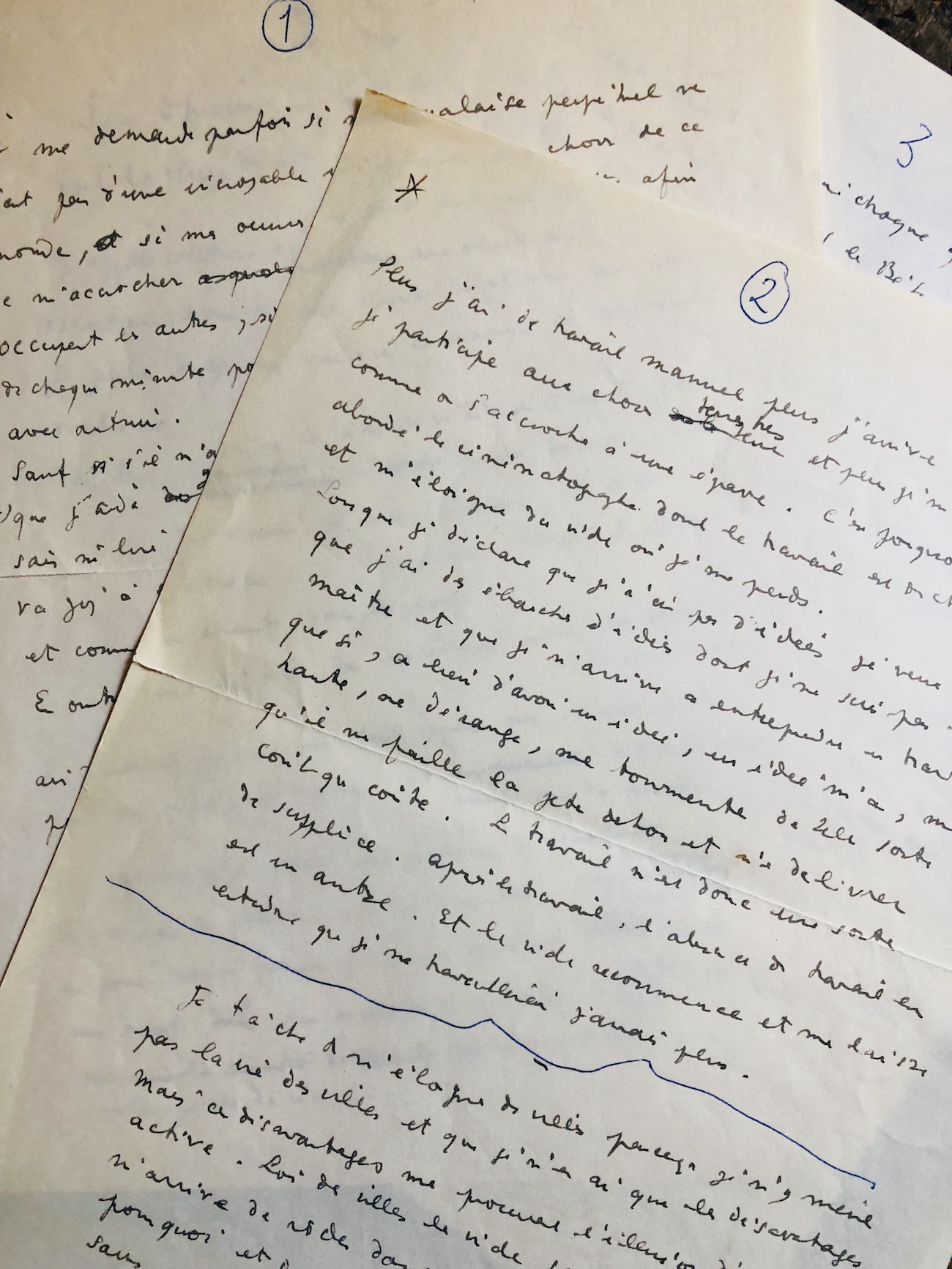Jean Cocteau (1889.1963)
Autograph manuscript.
Eight pages in-4°. Slnd (circa 1960)
“By pushing me to free myself from opium, those who love me have done me a service, but they have destroyed my balance and my peace of mind. »
Autobiographical manuscript by Cocteau describing his difficulty in living and creating, his fall into opium and his suffering.
The artist also describes his vision of the work of art, evoking Cinema, Picasso, Rimbaud, Chirico, Dali, and his own creations.
Cocteau here answers the questions of André Fraigneau who published a biography of the artist in 1957 and a book of interviews with him.
__________________________________________
“I sometimes wonder if my perpetual unease is not born from an incredible indifference to the things of this world, and if my works are not a struggle to cling to the objects that occupy others , if my goodness is not not a constant effort to overcome the lack of contact with others. Unless I happen to be the vehicle of an unknown force that I help to take shape, I cannot read or write or even think. This emptiness goes as far as atrocious. I furnish it as best I can and as we sing in the dark. Furthermore, my stupidity affects an air of intelligence which makes my clumsiness take for extreme mischief and my sleepwalking gait for the agility of an acrobat. There is little chance that this mystery will ever be clarified and I think that after my death I will have to suffer from a misunderstanding similar to the one that prevents me from living .
The more manual work I have, the more I come to believe that I participate in earthly things and the more I cling to them, like one clings to a wreck. This is why I approached cinema, whose work is every minute and takes me away from the void where I get lost . When I declare that I have no ideas I mean that I have drafts of ideas of which I am not the master and that I only manage to undertake work if, instead of having a idea, an idea has me, haunts me, disturbs me, torments me in such a way that I have to throw it out and free myself from it at all costs. Work is therefore a kind of torture for me . After work, lack of work is another. And the void begins again and suggests to me that I will never work again.
I try to move away from the cities because I don't lead the city life there and I only have the disadvantages. But these disadvantages give me the illusion of an active life. Far from the cities, the void shows itself naked. Sometimes I wander around my house without knowing why and find myself on a staircase or in a room for no reason. The result is that I find my balance neither in the hustle and bustle nor in solitude .
We were surprised and even shocked because I dwelled on the diary of Beauty and the Beast , and the difficulty of dealing with very painful illnesses. But I had to understand that the illness became a constant occupation for me and was a place of contact for me. She made me a sensitive man instead of an insensitive ghost. It humanized me and allowed me one of those exercises (like hunting, for example) that men engage in to amuse themselves. I suffer therefore I am . This is what excuses this immodesty. The second stage was: I am, therefore I think. And this proof of my state as a man forced me to think about not hanging myself in a sort of painless sleep .
I only begin to live intensely in sleep and in dreams. My dreams are detailed, terribly realistic. They lead me into countless adventures, into contacts with places, people who do not exist in the waking state and whose dream phenomenon invents for me the smallest objects, the smallest acts, the smallest words. I try to wipe it all away in the morning because I fear confusing the two worlds and adding the unrealism of my existence to the incomprehensible.
Without opium, it's annoying to talk about yourself all the time. I call indirect criticism a way of talking about certain things while talking about others. For example, I talk about the perspectives of life about de Chirico and de Chirico about the unusual dimensions in which poets live. There was the appearance of a painting which is not at all abstract but which focuses more on the problems which excite the writer (…) Chirico opened the secret doors to us with its squares, its arcades, etc. . Picasso….
Never has a work of mine been seriously studied , nor the works judged in relation to each other. People jump on me to the point of bending over and accuse me of being frivolous . Lightness certainly, and I boast of it. But not the one we think. Lightness consists of lightly judging a work without taking into account its roots. Every work has its hiding places and we wonder which is better, whether we discover them or not (…) An example: The Knights of the Round Table . It was after writing the piece that I realized that it was about detoxification. By pushing me to free myself from opium, those who love me have done me a service, but they have destroyed my balance and my peace of mind. This is what the play explains. No one suspects it and we will see a subject like any other, a subject that I chose, whereas the subject imposed itself on me without me even realizing the transposition that was taking place in my mind. person and the true meaning of the plot. Nothing is more beautiful than the work of a poet .

